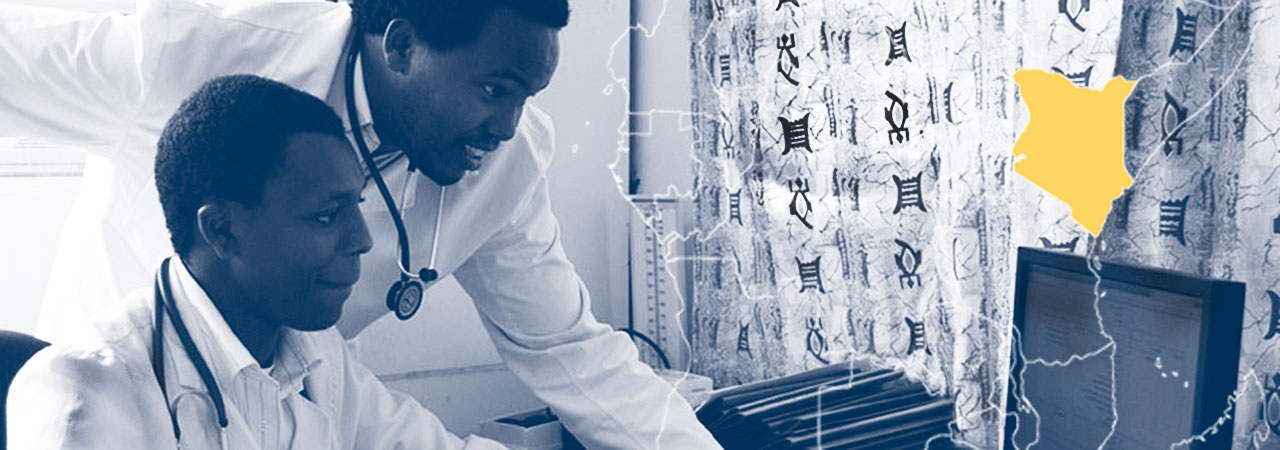I-TECH specializes in developing appropriate research designs and methods for application in resource-limited settings, to get answers to research questions in real time. A university-based program, I-TECH draws from experts in qualitative and quantitative methods in a wide range of theoretical and practical disciplines, including health economics, anthropology, health sciences, medicine, and education.
Category: Pamela Collins
Kenya

Since 2005, I-TECH has drawn on expertise from the University of Washington and the University of California, San Francisco, to support the Ministry of Health (MOH) in advancing priorities in the areas of health information systems (HIS), HIS leadership and governance, Global Health Security (GHSA), and evidence-based Infection Prevention and Control (IPC) practices.
I-TECH Kenya’s programs aim to improve the quality of patient care and enable health care facilities to meet their health information, data collection, and reporting needs. I-TECH Kenya’s GHSA funded programs aim to advance the Global Health Security Agenda through strengthening information systems and reporting, and improving IPC in health care facilities.
In all efforts, I-TECH Kenya works closely with the MOH and local partners to develop and implement programs that can be successfully transitioned to local ownership, ensuring sustainable progress toward Kenya’s long-term health goals.
Program Highlights
Botswana

The Government of Botswana has made a strong national commitment to fighting HIV, and was one of the first countries in Africa to launch a nationwide response to the HIV epidemic and to offer free antiretroviral treatment to its citizens living with HIV. The estimated HIV prevalence in Botswana is 21.9% among population aged 18 months and older, which is down from over 25% a decade ago. There are currently about 360,000 people living with HIV, and of those, more than 300,000 are on treatment. [UNAIDS 2017].
In 2003, I-TECH began to partner with the Government of Botswana to combat HIV and has continued to work closely with the Ministry of Health and Wellness (MOHW), the U.S. Centers for Disease Control and Prevention (CDC) Global AIDS Program, and local and international partners to respond to the health needs of the people of Botswana.
With I-TECH support, the MOHW has made great strides in HIV Testing Services; laboratory systems continuous quality improvement; monitoring and evaluation of HIV and tuberculosis; health informatics; and operations research. I-TECH Botswana has been providing direct service delivery and technical assistance in support of the Government of Botswana’s health priorities, specifically targeting the first 90 of the UNAIDS 90-90-90 goals—that 90% of the population knows their status. Sustainable transition to local ownership is a key component of all work conducted by I-TECH Botswana.
In 2020, I-TECH launched the Botswana Training and Education Center for Health (B-TECH), an independent, locally registered organization. Through funding from HRSA, CDC, and the US President’s Emergency Plan for AIDS Relief (PEPFAR), I-TECH and B-TECH work in close partnership to implement programs such as improving direct service delivery and continuous quality improvement approaches; providing cervical cancer screening, treatment, and care; and developing and maintaining a national COVID-19 vaccine registry.
Current Program Highlights
Past Programs
Ukraine

To support I-TECH Ukraine during this crisis, donate to the I-TECH Humanitarian Fund.
I-TECH began working in Ukraine in 2011 at the invitation of the U.S. Centers for Disease Control and Prevention and the Ukrainian Ministry of Health. I-TECH currently supports the Government of Ukraine in implementing reforms in health services management, human resources for health, and other key areas to improve service provision for people living with HIV and achieve the UNAIDS 95-95-95 Fast Track targets.1
Ukraine is experiencing one of the fastest-growing HIV epidemics in the world, with twelve central and eastern large industrial regions of Ukraine being most affected.2 There is an estimated 260,000 people living with HIV (PLHIV) in Ukraine, 120,000 of which are women.3 Injection drug use was the main pathway for the spread of the disease from 1995 to 2008; sexual transmission, also among men who have sex with men, has been a growing primary mode of transmission.2
Ukraine has made significant progress in achieving the UNAIDS 90-90-90 targets over the past two years. As of early 2020, 68% of estimated PLHIV in Ukraine were aware of their HIV status; 80% of PLHIV, who tested positive and registered with the healthcare system, received antiretroviral therapy (ART); and 94% of PLHIV who received ART had undetectable viral loads.2
Considerable challenges remain with timely HIV testing/diagnostics in early stages, especially among hard-to-reach populations. The number of officially registered HIV cases in Ukraine also dropped in 2015-2016 as a result of the armed conflict in eastern Ukraine and due to loss to follow-up of people living with HIV in the affected regions of Donetsk and the Crimea.2
Sources
- The Cabinet of Ministers of Ukraine (CMU) (2019). The National Strategy on HIV/AIDS, Tuberculosis and Viral Hepatitis Response for the Period until 2030.
- The Ministry of Health of Ukraine (MoH) (2020). HIV in Ukraine, Information Bulletin #51, 2020.
- UNAIDS (2020). Country Factsheets: Ukraine 2020.